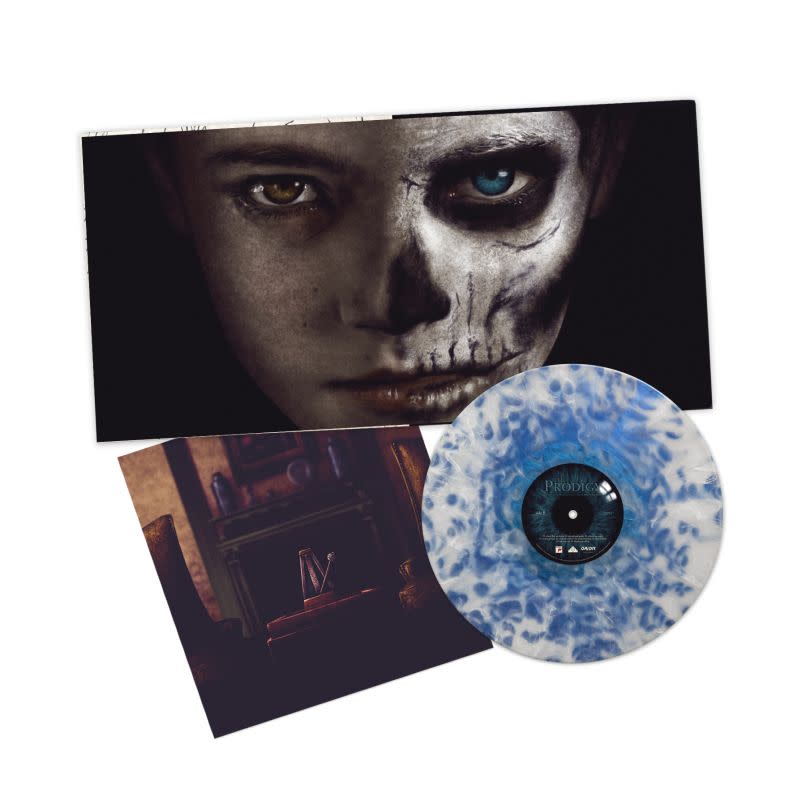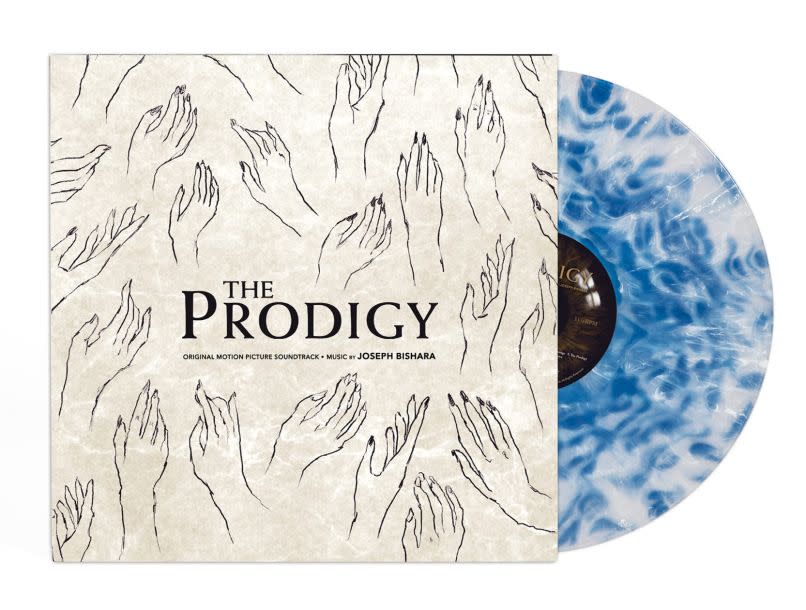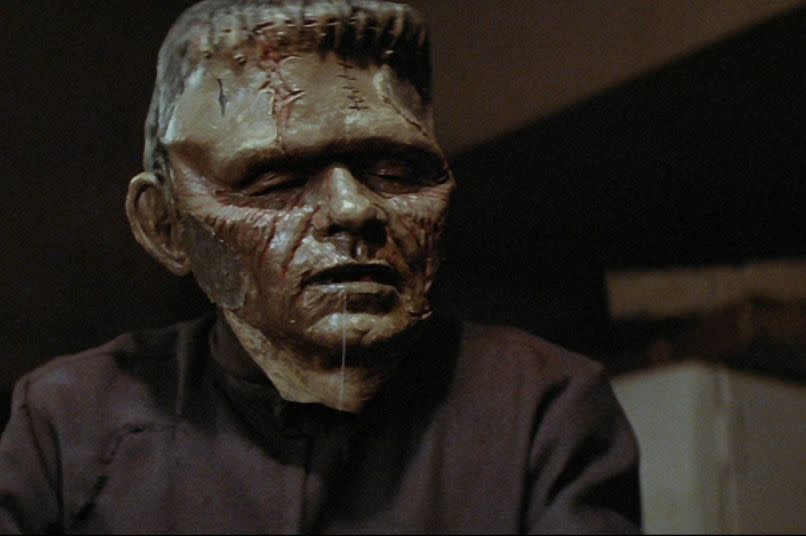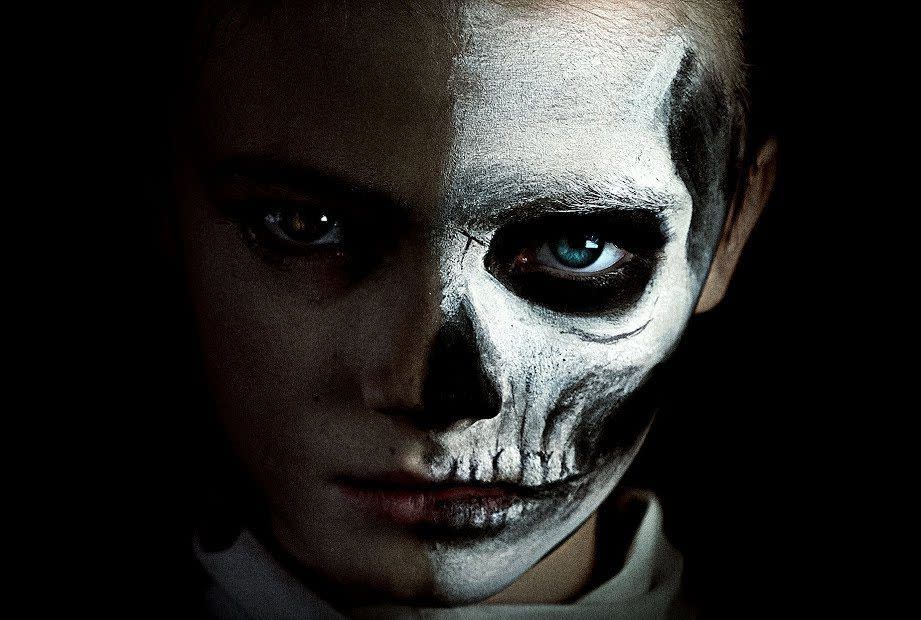The Prodigy composer Joseph Bishara revisits horror roots ahead of “possessed” Waxwork vinyl release
Possession is a chilling concept. The notion of something evil living inside you is a fear that dates back to the desert days of the Bible. Over time, that terror has become a popular theme in horror, from 1973’s The Exorcist to this weekend’s The Prodigy.
In celebration of the new movie, Waxwork Records and Orion Pictures have done some possessing of their own by pressing Joseph Bishara’s unnerving score to UV reactive 180 gram vinyl, giving the release a spooky glowing effect when exposed to black light.
To round out the release, Waxwork has given the vinyl a “Blue Iris” splatter, which adds a chaotic effect to the emanating presence, in addition to new artwork by Adam Rabalais, a printed insert, old style tip-on gatefold jackets, and high quality LP packaging.

Rest assured, Bishara’s compositions fit the mold as the musician adds another essential score to his catalogue. Similar to his work on Insidious and The Conjuring movies, The Prodigy excels from lush orchestral textures that are as timeless as they are chilling.
Pre-orders are currently on-going. To get a better sense of the man who possesses the record, read ahead for our interview with Bishara in which he discusses how his earliest memories in the horror genre, the ways he develops fear, and his favorite movie monsters.
What were some of your earliest experiences watching horror movies?
One of the first horror movies I remember seeing was The Cabinet of Dr. Caligari. I actually came across a Super-8 print of it — my parents had a Super 8 projector — and I remember watching that by myself in the living room one afternoon. That was one of my earliest memories of seeing darker, stranger imagery. I don’t know if it particularly scared me necessarily, though.
I also remember seeing things like just catching a glimpse of Jaws, where the head pops out of the boat with the eyes. Just seeing an image like that when I was probably seven years old. There’s just something compelling about that feeling of revulsion and attraction at the same time, and it was extremely compelling for me. It caught me and I saught it out whether I understood it or not.
It became a drive very early for me.
At what point did you know you wanted to get involved in the genre?
I was very drawn to the makeup effects, so I would just pore over all those books, reading the horror magazines, and seeing how those things are done. I would buy all those monster makeup kits and scar stuff and certainly Halloween was a good time to reflect all that. That’s what I thought I wanted to do, but pretty close to the same time, I was also drawn to music and listening to it and fascinated with the idea of even being able to create sounds. It came together very naturally.
With so many horror scores under your belt, how do you keep evolving your sensibilities?
I don’t really think about that aspect much to be honest. I don’t necessarily come across something and go, “I did that.” I don’t really think about that. It’s always something new for me. It’s always looking into whatever this thing is. Even if it’s a fourth sequel in the series, it’s still, at the time, to me, saying something different. And even has this different version of a previous thing. I think in sequel scores, it’s like a different dialect of the same language. It’s the same language, but this is just different region of that territory. It’s just always something different.
Do you always score to picture?
No, I do a lot of developing score away from picture. I’ll start as early as I can. I’ll even start writing to and literally in the script. I have a script right now that has a lot of scores scribbled in the margins. I like to start with whatever the ideas are in there that are being developed and try to let those just inform the musical approach and as early as possible.

The Prodigy (Waxwork Records)
What instrument do you find to be the most effective in instilling terror or dread?
There are a million production tricks or just things that have certain effects. When it comes down to what they sound like, to me, even a jarring shock moment, a jump scare, I hear all of those differently in my head than when I’m watching them. They’re all different phrases. It’s like how many ways can you scream out an expletive. [Laughs.] There are a lot of different ways to approach these things. I just sort of hear them differently as opposed to having a loud sound tool kit that’ll scare people.
There are some gorgeous dramatic flourishes in this score, particularly with the piano and strings. Much like drama informs humor, do you feel drama is paramount for horror?
It does need to be addressed. Every one of these scores tell a different story with a different approach being taken in a different way. It’s really a matter of looking at what it is and if it’s there to address it and if it’s not then I suppose it has no place in that world.
You’re often scoring multiple horror movies at a time. Do you ever get lost in the chaos?
There are techniques, practical considerations, and workload things … things like that can certainly carry over into the implementation, but as far as the musical sounds and ideas, they’re totally different. Though, if I’m scoring multiple things at the same time, it does take a minute to sort of shake my head and, say, “Wait what language do we see here?” It’s kind of like if you were traveling around to a lot of different, small European cities pretty close to each other, and you had to keep track of the language being spoken in that place.
It seems that projects are always at different stages, though, and no matter how it’s sliced, they’re very different voices with different motives that are happening. But The Prodigy was a blast to work on. It was really cool to get to explore what was happening in there, and the first thing I got to write was the nursery rhyme, which is pretty central to the main characters in that, and that needed to be written before shooting happened because people were humming it on set.
So, it was fun to talk about it with [director Nicholas McCarthy], send him it, and get back little iPhone clips of [star Jackson Robert Scott] humming it. There was definitely a good level of immersion to be able to be sitting in the studio, sending off a track, and getting back video from the set of it happening on the film.
Out of all the genres, horror seems to have the fastest turnaround, too.
It’s pretty crazy how fast I can get turned around sometimes. Sometimes, it seems like it just keeps getting faster. It never gets to the point where it just isn’t doable, whether it’s doable or not doesn’t really even come into play as part of the conversation. “Really? We’re making it in four days? Okay how do we make this happen?” You just have to figure it out.
There’s the old story of John Carpenter scoring Halloween in a few days. You two worked together pretty early into your own career on 2001’s Ghost of Mars. Did he share any pointers with you?
It was so cool to even just get to go do that. It resulted in spending close to two months in the studio with him. I think it was five or six weeks, maybe in there, but he was in the studio in Hollywood that is no longer there that was called Cherokee. It was a great space, a bunch of amazing records were done there. It would be hard to imagine that kind of pace or schedule now. It was a lot more time than what would happen today.
By the time I came in, [John] was already far along with some of it and there was a lot to do, but it was pretty much a couple of the synth lines that he’d be tracking in. He wasn’t programming any, he was just playing the parts in, and working with a producer, we had another engineer there as well, and they brought me in with my personal setup.
I had been doing a lot of programming and sound design at the time — remixes, that kind of thing. I brought my setup in and just had a chain where they’d feed his recordings into mine and I essentially remixed them. He’d be hanging out and say, “Great.” He was having a blast. It was a lot of fun. I was a huge fan, and as a huge fan, to get to meet him, even just get to go say “Hi” in a professional context was awesome.
You’ve since become a longtime collaborator with James Wan. Are you two gonna reunite for The Tommyknockers?
I honestly know nothing … You just told me more than I’ve ever heard about it. I have no idea what he intends to direct next. As far as I know, right now he’s taking a little break. I really hope he’s sticking to it … God knows he needs it. The pattern I see with him is that he’ll do something massive and then need to take a break for a minute and then he’s itching to do it again. He totally loves it. I couldn’t imagine him ever retiring from filmmaking.
Your discography suggests you’re a workaholic yourself, though.
I do feel like I hit a point where … it’s almost like I don’t really know when it’s coming and all of a sudden I’ll run out of track. But those are the times where I feel like it’s nice to just take in, listen to music, watch movies. When I’m working a lot, I don’t really have time to do that as much as I would like. It’s nice, after a period of just putting out, putting out, putting out, to just stop putting out and just take stuff in for a little bit. That feels really great.
In terms of taking in pop culture, are you a vinyl collector?
Yeah, definitely.
Any recommended must-haves that you suggest?
There’s a lot of stuff that I love. I collect things and I enjoy them, but I don’t have the … “holding-on” aspect of a collector. I like to enjoy things, but I’m perfectly fine letting them go, too. That said, I’ve had a pretty old, worn, beat-up vinyl copy of Tangerine Dream’s Sorcerer that I’ve had for god knows how long. Still sounds fantastic, even though it’s about as thin as a thick piece of paper. I also have one of the original pressings of Liquid Sky.
You’ve played a number of monsters in the movies you’ve scored over the years — including the iconic villain from Insidious — were there any opportunities for The Prodigy?
No. They never really came about. There weren’t real creatures in The Prodigy, it wasn’t really that kind of movie. That just doesn’t really come up. I found myself more in the makeup chair when it came to that sort of thing, which was so awesome. I was so drawn to effects early on so it was like “Sure, that makes sense.” At the same time I was like, “Really? I get to do this?”
Looking back, is there a monster you wish you could’ve portrayed from the past?
One of my favorite movie creatures has got to be the Funhouse Freak from The Funhouse. The design of it, how it’s portrayed, how it feels. It’s a monster in a monster mask for the first half of the movie. There’s something really cool about that.

The Funhouse
It’s almost more unnerving than The Texas Chain Saw Massacre.
I think it’s under-appreciated. It doesn’t get as much love. Fans get it, but it seems to be one that’s overlooked in the more mainstream canon.
Speaking of the mainstream, it feels horror has certainly hit another mainstream level over the years. What are your thoughts on the state of the genre? Are you worried as to where it’s headed?
The other day, I was having this conversation with a friend of mine, and they said, “Yeah, it seems like horror is doing really well now,” and my response was, “It seems like it’s been doing really well for a long time. I don’t think it is just right now.” But it’s interesting to me that it always sort of seems like a renaissance. You don’t ever really ever hear things like, “Oh yeah, comedy is starting to do really well.” No, it’s always done well.
Taking that into consideration, I think it speaks more to the nature of horror, where there is just something compelling about this because it literally feels life-or-death. It feels like something very immediate, which gives it a different flavor. I think it goes back to the makeup effects camps having these cool, edgy, rebellious nature to them that we were speaking about earlier.
Any of these freaky things that you relate to, whether it’s horror, whether it’s black metal, whatever it is, that seems to be on the outskirts, when you get down to it, a lot of the people doing some of the darkest stuff are the nicest people you’re ever gonna meet. And these are the people that you’re gonna want to spend more time with rather than perhaps the person making the safe, friendly movie.


